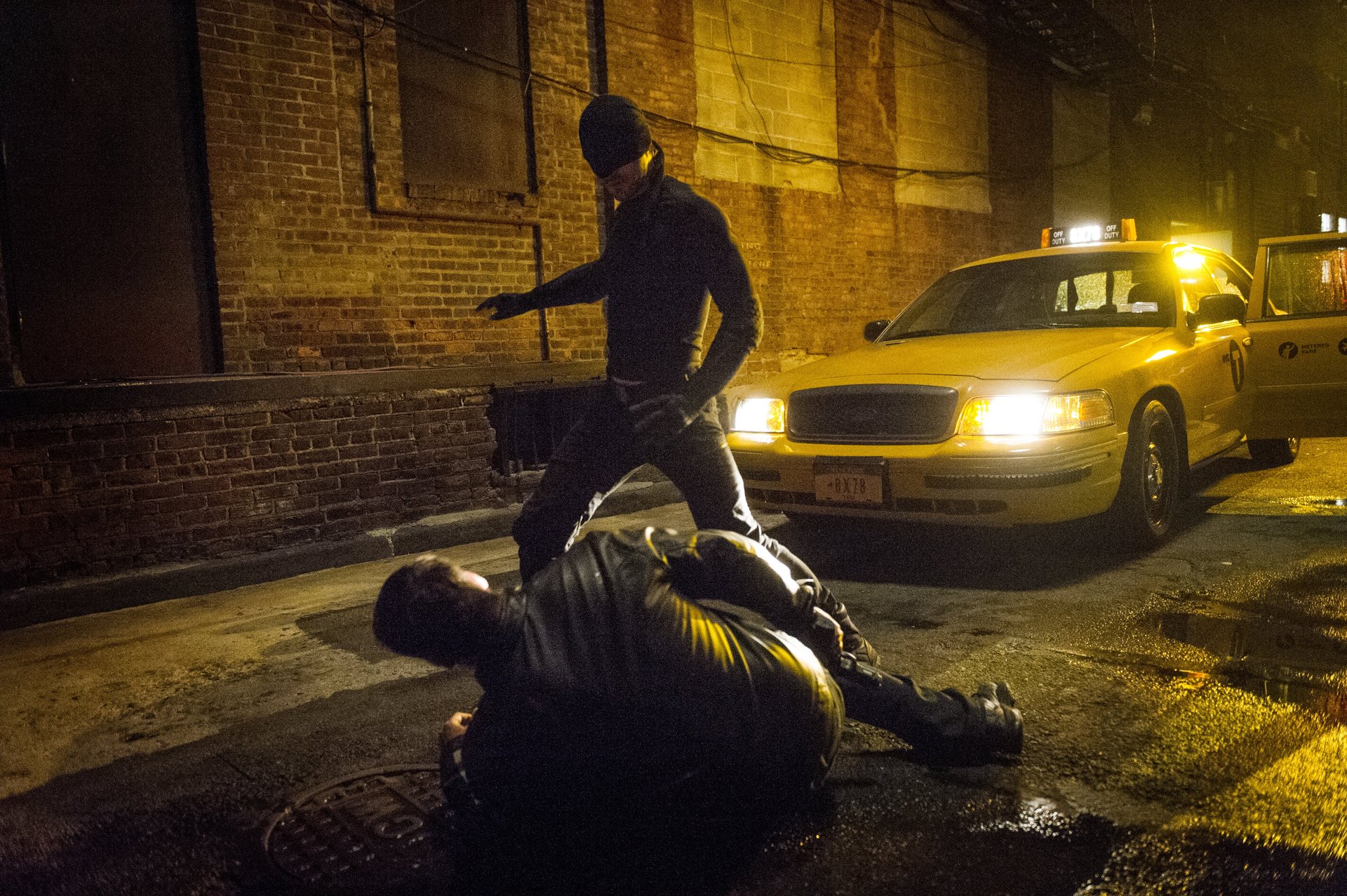Inside Netflix and Marvel’s titanic team up on Daredevil
Marvel is no stranger to powerhouse collaborations—look no further than the superhero supergroup assembled for next month’s Avengers: Age of Ultron—but its most promising, game-changing partnership this year has nothing to do with Iron Man and Captain America. Instead, it appears at the beginning of the opening credits sequence for its new TV series, Marvel’s Daredevil, which reads, “Marvel Television and Netflix Presents.”


Marvel is no stranger to powerhouse collaborations—look no further than the superhero supergroup assembled for next month’s Avengers: Age of Ultron—but its most promising, game-changing partnership this year has nothing to do with Iron Man and Captain America. Instead, it appears at the beginning of the opening credits sequence for its new TV series, Marvel’s Daredevil, which reads, “Marvel Television and Netflix Presents.”
Bringing together Marvel and Netflix, Marvel’s Daredevil, which debuts its thrilling 13-episode first season on Netflix April 10, ushers in an Avengers-level teaming up of Hollywood titans. In the past few years, no two companies have changed the entertainment landscape as much as Marvel (now every studio is pursuing its own version of the Marvel Cinematic Universe) and Netflix (which between pioneering binge-watching and creating groundbreaking shows like Orange is the New Black, has knocked every other network on its heels). Now they are at it again, devising an exciting new path for the crowded TV superhero genre.
Daredevil tells the story of Matt Murdock (Charlie Cox), a boxer’s son who grew up in Manhattan’s Hell’s Kitchen and was blinded as a child after saving a man from a truck carrying hazardous chemicals, which took his vision but heightened his other senses. Murdock is now a lawyer by day (he has started a law firm in Hell’s Kitchen with his friend, Foggy Nelson), and masked vigilante by night, as he protects his neighborhood by any means necessary.
Marvel and Netflix have a lot riding on Daredevil, which is the first of four series for the streaming outlet that will focus on Marvel’s “street-level heroes.” It will be followed by Marvel’s A.K.A. Jessica Jones, Marvel’s Iron Fist and Marvel’s Luke Cage. Then, all four characters will team up for a fifth series, Marvel’s The Defenders. Sound familiar? It’s the same winning formula Marvel executed on the big screen, with standalone Iron Man, Thor, Captain America, and Incredible Hulk movies leading into the megablockbuster The Avengers.
The secret to Daredevil’s success? It keeps the stakes relatively low, confining the fight to a single neighborhood, which was partially destroyed and is still rebuilding after The Battle of New York (i.e. the climax of The Avengers). In narrowing its focus, the show sidesteps one of the biggest problems that plagues Marvel’s Agents of S.H.I.E.L.D. on ABC—which like all Marvel productions is part of the shared Marvel Cinematic Universe: if these threats were really serious, wouldn’t one of the Avengers step in to save the day?
The show also deftly skirts the usual superhero origin story tedium by having our hero already kicking ass five minutes in, even if his costume—a black scarf covering his face—is still a “work in progress,” as he says. (So is his name: at this stage, his alter ego is known as “The Man in Black.”) His backstory unfolds via childhood flashbacks, and the show’s first season build to a showdown with developer Wilson Fisk—aka Kingpin, played by Vincent D’Onofrio—whose name is rarely uttered, much like Lord Voldemort in the Harry Potter series.
Unlike the other TV superhero series, Daredevil is aimed at grownups—or, at least, not the kids who watch much of Netflix’s other superhero fare. Karen Paige (Deborah Ann Woll from True Blood), the firm’s first client turned secretary, notes that after the violent events of the first episode, “I don’t see the city anymore. All I see are its dark corners.” And that is where Daredevil lives: the show employs a very dark palette (after all, Murdock doesn’t need lights). While Marvel’s Agents of S.H.I.E.L.D. and Marvel’s Agent Carter are glitzy and glossy, this one is gritty and grimy. An early episode features a brutal, gruesome decapitation; not something you’d find on any broadcast TV show.
But where Daredevil—which erases all memories of the mediocre 2003 film with Ben Affleck—really shines is in its inventive action sequences, particularly an ingeniously executed, prolonged fight sequence late in the second episode. It feels real, and brutal. You can see superheroes fighting back guys all over TV, but nowhere else does it feel this visceral.
As we border on comic-book fatigue (there’s The Flash, which remains the best of the bunch, plus Arrow, Marvel’s Agents of S.H.I.E.L.D., Marvel’s Agent Carter, Gotham and Constantine, with Supergirl and an Arrow/Flash spinoff on tap for next season), Daredevil stands out because it’s so scrappy and self-contained—there’s no huge mythology to service.
Daredevil also proves that there’s still plenty of inventiveness left in the overwhelemed superhero genre, which bodes well for the upcoming Marvel/Netflix collaborations. While these “street-level superhero” shows might have not have cultural impact of Marvel’s films, they are going down a dark path that its movies can’t follow (at least, not if they want to continue grossing billions worldwide)—and that is much more exciting than anything else Marvel has yet brought to television.
Marvel and Netflix still have a long road ahead, but they couldn’t have asked for a better start to their partnership than Daredevil. The union of two entertainment behemoths could have been a disaster—remember what happened when AOL and Time Warner joined forces?—but instead, it seems to be the beginning of a wonderful friendship. Bring on Marvel’s A.K.A. Jessica Jones!